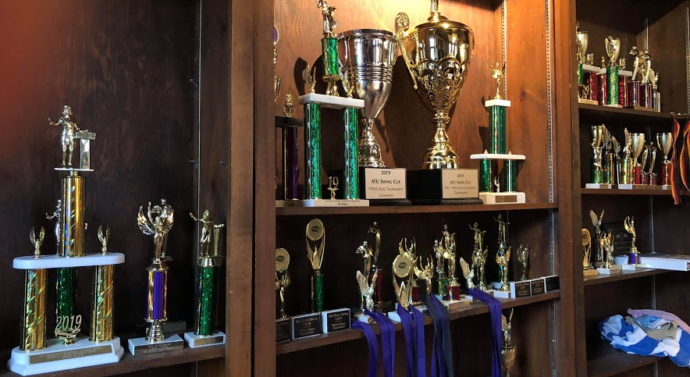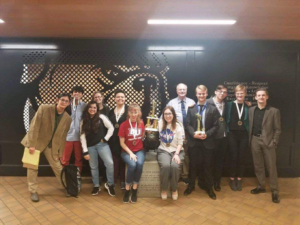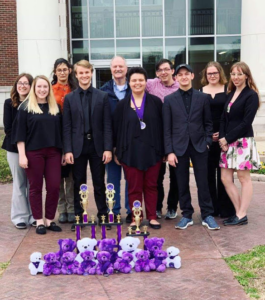
Members of Debate Union express frustration in wake of changes to the program
Campus News, Front Page, News April 5, 2019, Comments Off 605On Feb. 26, 2019, the Drury Debate Union was notified that Dr. Charles DeBerry, an instructor of communication and the director of the Drury Debate Union, will not be returning to Drury at the school’s request. This abrupt change cast a shadow of uncertainty over the future of the Debate Union; however, last week administration announced that the Debate Union will have a new coach by August 2019.
Finding a coach

Photo via Debate Union.
Finding someone to fill the shoes of debate coach is no easy task.
“A team really can’t function without a coach,” said Emily Collier, the Debate Union’s vice president of finance. “We need more than just guidance. We also need instruction.”
There is a considerable time commitment expected of a debate coach. Every semester, over a two- or three-month period, the team competes every other week for four or five days at a time. The team also meets twice a week to practice.
Finding a replacement for Dr. DeBerry specifically is its own challenge.
“I think what I’ll miss most about DeBerry is his kindness towards students,” said Erin Benedict, president of the Debate Union. “He allowed the students the freedom to find what’s best for them and did not try to impose one certain style on anyone. He would guide each person differently, based on what their strengths and weaknesses were. He wanted everyone to reach their own unique potential and was more committed to that than to points or season [rankings]… He was also always willing to go to bat for us and was extremely passionate about the debate program.”
On March 26, 2019, the Dean of the School of Communication & Fine and Performing Arts, Dr. Allin Sorenson, released a statement to The Mirror that named Dr. Dan Ponder as the group’s new faculty adviser. Dr. Ponder is a professor of political science and co-adviser of Drury’s pre-law program. Moving forward, the team will have both a coach and an adviser, a move which Sorenson believes will increase cross-campus collaboration and visibility for the program.
The statement reads, “Dr. Ponder and Dean Julian will be overseeing the search for a coach for the team, and will have a coach in place prior to the start of the 2019-2020 academic year.”
Ponder has 10 years of experience as an adviser for Drury’s pre-law program. He will serve as a resource for the Debate Union but not as a replacement for a coach.
“I have been pleased to have a number of current and former debaters in my classes in recent years and am looking forward to serving as a faculty adviser for the Debate Union,” said Ponder in the statement.
The statement
The statement revealed that the program will be moved from the Department of Communication to the Department of Student Affairs. Sorenson explained the reasoning for the move.
“Student Affairs is in the best position to oversee and promote the debate program,” he said.
Benedict has met with Dr. Sorenson and Executive Vice President and Provost Beth Harville to talk about specifics of the team’s future. Benedict told The Mirror that the team still has questions that have not been answered.
“They have not described what the search for a coach will look like, and that is concerning to students,” she said. “We aren’t getting answers to questions regarding how they’re finding a coach.”
Additionally, she said, “There is a definite lack of communication between administration and debaters. It doesn’t make anyone feel like administration cares about debate.”
In the wake of the program’s transition, many debate students have expressed longstanding frustrations with administrative decisions regarding the team.
Financial frustrations
Currently, the team is funded by a combination of funds from the Student Government Association (SGA), institutional funds, and money saved from previous years. SGA generally only allocates a maximum of $10,000 to clubs. The Debate Union needs at least $30,000 per year to operate normally, meaning both institutional funding and SGA funding is required.
According to the statement from administration, “Funding for the program will be transferred to the student services budget and is expected to continue at the same level as it has in this academic year.”
In the 2018-2019 academic year, the team received $15,000 from institutional funding and about $4,400 from SGA, according to Collier. In order to meet the $30,000 minimum that Collier describes as necessary to remain competitive, the team exhausted their savings to make up for the remaining $10,600 needed. Should the budget continue at its current level, the team will not have enough money to remain as competitive as they have been in the past.
However, Collier expressed that the team’s frustration is not with SGA.
“There are no hard feelings between the Debate Union and SGA because we understand that they don’t have the money to offer clubs $30,000,” she stated. “It’s a game of administration telling us to go to SGA, and SGA tells us to go back to the administration.”
In addition, Collier claims that Drury administration has barred the team from personally fundraising or seeking out private donations.
“In the first year, we were allowed to take private donations,” said Collier. “The second year they tightened down, saying it had to go through the school, and then a donation was turned down this year. [Drury administration] basically just said that the team can take this donation, but it will have to be after next semester and [administration will] hold onto it… the donor didn’t agree to that.”
In response to this claim, Sorenson said, “The University will continue to accept donations to assist in funding the debate program. All fundraising efforts are coordinated through the Office of Advancement.”
The Debate Union’s activity grants will be guaranteed next academic year. Collier explained that activity grants were scholarships for students in the debate program. Activity grants do not go toward funding tournament participation.
According to the statement, Drury’s funding of activity grants for debate students has increased “nearly ten-fold since the 2015-2016 academic year.” Furthermore, activity grants for new students joining the Debate Union in the fall of 2019 are already committed.
The importance of the Debate Union

Photo via Debate Union.
The first year after the team’s revitalization, the Drury Debate Union brought home three national titles; last year saw yet another. The team has also had sweeping successes in nearly every tournament in which they have competed. The team’s trophy display case almost overflows with awards and honors.
Debate has changed the lives of the students who participate.
Freshman Caleb Conaway said, “As a new member of the team, debate is a safe space for people to practice what they know, how to communicate effectively, and is a great way for me to do what I love with people who really care for me and care about my future and my success.”
“Presentations are a big part of what I’m going to be doing,” added Aedan Wright, a freshman architecture major. “I needed to learn how to do that sooner rather than later, and the people in the debate team have helped me so much more than I could have ever done on my own.”
Katie Powell, another freshman member, shared how debate has helped her learn about herself.
“Debate has helped me come out of my shell and helped me discover who I actually want to be in life… I’ve found a new family here and made so many friends, some who are even my best friends,” she stated.
Collier shared an equally personal connection with debate: “In high school, I was involved in a lot of activities, but in college, this is my one activity. I put all my time and effort into this. I think debate is the single most beneficial thing a person can do for their future. Beyond that, it builds relationships with people I need to build relationships with.”
Debate has been an instrumental part of many students’ college experience.
“Without this debate team, I would be uninvolved on campus,” said Conaway. “I would not be nearly as involved with Drury as I am.”
“I’ve made so many connections through debate,” Collier said. “Debate is an automatic connection for… anyone.” After a pause, Collier shared, “Without debate, there is a good chance I would be dead.”
Finally, debaters shared their frustrations with the Debate Union’s struggles over the past three years. All the students interviewed agreed with a sentiment made by Collier: “I can’t help but feel like the administration doesn’t want us or debate at Drury.”
In response to this sentiment, Sorenson said, “The university is committed to supporting and growing the debate program. Times of transition can be stressful, but with Dr. Dan Ponder as faculty adviser in addition to a coach, the future is bright for debate at Drury.”
Article by Forest Swisher.